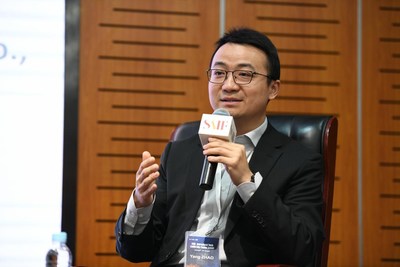Kuai Niu Group Stays at the Forefront of Applying AI to Financial Services
SHANGHAI, Jan. 31, 2018 /PRNewswire/ -- Kuai Niu Group, one of the leading providers of financial technology solution, is ramping up efforts to speed up the integration between artificial intelligence and traditional financial services, in an effort to bring about innovative and disruptive change in the sector.
Senior Vice President Zhao Yang said the Shanghai-based fintech startup leverages AI technology to develop its own risk control system called Yuanfang, which boasts strong capabilities of anti-fraud identification and massive user data processing.
"That system is our 'weapon'. We can apply it to whichever sector, either a business-to-business or business-to-consumer market, that makes profit or wins customers," Zhao said on a recent panel discussion. "We have reached deep cooperation with Chinese tech giants including Baidu Inc, Alibaba Group, Tencent Holdings Ltd, and JD.com."
He made the remarks on the 2018 SAIF MF International Youth Leadership Finance Summit in Shanghai. The four-day event, starting on January 27, gathered a host of scholars, experts and business leaders who have domain expertise in the financial sector.
Distinguished keynote speakers include Chang Chun, executive dean and professor of finance at Shanghai Advanced Institute of Finance, Che Pinjue, expert partner of Sequoia Capital China, and Mu Haijie, senior vice president and president of Remittance Data, Remittance World.
This year's summit put the spotlight on fintech, with topics ranging from robo-advisors to data mining.
Four topics have drawn wide attention and thorough discussions and they were Rotation Strategy within the Banking Sector, Design of Blockchain Application, Quantitative Asset Allocation Using Black-Litterman Model and Credit Risk Model for Individual Loan.
In the past, financial managers get to know their customers mostly based on the one-page form they populate, and thus make suitable product recommendations or decide proper loan limit.
That one-page form, according to Zhao, was far from enough to adequately allocate financial resources. In a roundtable, he outlined his vision for a change that fintech helps improve the marketing strategy of financial products.
Competition in the fintech sector becomes increasingly intense, as more and more established firms and fledgling private companies jump on the bandwagon.
They are attracted by the disruptive nature of fintech, look for partnerships to boost their operational efficiency, and meet customer demands for innovative services.
Last year four Chinese tech tycoons, Baidu Inc, Alibaba Group, Tencent Holdings Ltd and JD.com (collectively known as BATJ), announced, respectively, to engage in considerable collaboration with one of four State-owned banks including Industrial and Commercial Bank of China and Bank of China.
According to PwC's DeNovo, recent achievements in AI have enabled the technology to top the list for financial services.
Startups that integrate AI with financial services have been funded more extensively, with an average funding of $1 billion over the last two years, the report said. Also, thirty percent of large Financial Institutions are investing in AI.
Eighty-two percent of incumbents are expected to increase fintech partnerships in the next three to five years, indicated by PwC's DeNovo. Annual return on investment on fintech related projects is estimated to be 20 percent.
Facing fierce competition, the crucial method for startups to maintain healthy and sustainable development is how to position them in a unique manner, business insiders said.
"Kuai Niu positions itself as an AI-enabled group that delivers technology solutions for upgrading financial sector. Our goal is to outpace financial services companies (rather than BATJ). All we need to do is to provide technologies and services better than other financial services firms," Zhao said. Founded in 2014, the company has received B+ round financing.
"Startups and small-and-medium enterprises are nimbler than established ones," Zhao added.
Che Pinjue, expert partner of venture-capital firm Sequoia Capital China, agreed with Zhao's view. He said big companies' problem lies in the fact that too many opportunities and temptations distract them from identifying core issues.
"But a startup could lay laser focus on one field, and make the most out of it," said Che, who was former vice-president of Alibaba Group.
Che said data is industry barrier and computing is innovation, citing Didichuxing, one of the leading ride-hailing companies in China.
Experts called on efforts to ensure that fintech -- still in its infancy -- develops in a well-regulated environment.
"Risk regulation is needed to protect consumers' rights and to fight against financial fraud. Workers in new finance should follow the rules of the financial industry and accept regulations, rather than trying to avoid them," Yang Zaiping, secretary-general of the Asia Financial Cooperation Association, wrote in an article published on China Daily. He was also former deputy president of the China Banking Association.
Risk regulators should put fintech under regulation, Yang elaborated. "They cannot ignore it, or only see parts of it. They should also conduct research into characteristics of fintech, learn about its rules and then make new regulating solutions based on its features and development rules."
"The regulators should recognize and encourage mature technologies to be applied in the financial sector, such as blockchain. They should also tolerate unsystematic risks in the early stages, and encourage industry associations to practice self-discipline and self-regulation," he added.
Liu Ruixue, co-founder and vice-president of VFinance, said regulation should also keep abreast of the times. "Regulators should also consider capitalizing on technologies, which can give them more information."
By accumulating large amounts of data, regulators are able to analyze and assess the market and set the landscape for innovation while ensuring that they evolve, according to the PwC Global FinTech Report 2017.
The report also found the use of blockchain is also a specific area of interest for regulators given the native 'regulatory capabilities' that are embedded in the technology. Transactions can be validated on the fly rather than monitored by intermediaries after the fact.
![]() View original content with multimedia:http://www.prnewswire.com/news-releases/kuai-niu-group-stays-at-the-forefront-of-applying-ai-to-financial-services-300590911.html
View original content with multimedia:http://www.prnewswire.com/news-releases/kuai-niu-group-stays-at-the-forefront-of-applying-ai-to-financial-services-300590911.html







